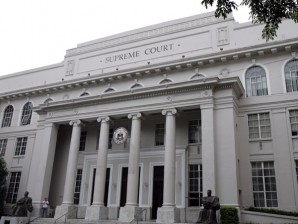SC: Only 1 member of Congress should be at JBC
MANILA, Philippines – The Supreme Court stood pat on its earlier ruling that only one member of Congress should be at the Judicial and Bar Council.
Voting 9-3-3, the high court, in dismissing the appeal filed by Congress, maintained that the Judicial and Bar Council (JBC) should only have 7 instead of 8 members.
The JBC is constitutionally mandated to screen aspirants for the Judiciary and the Office of the Ombudsman. Then, they submit a short list of nominees to the President who then will make the appointment.
In its July 2012 ruling, the high court said “to allow the Legislature to have more quantitive influence in the JBC by having more than one voice speak, whether with one full vote or one-half a vote each, would, as one former congressman and member of the JBC put it, ‘negate the principle of equality among the three branches of government which is enshrined in the Constitution.”
Senator Francis Escudero and Iloilo Representative Niel Tupas Jr. are both members of the JBC representing Congress.
Article continues after this advertisementThe case stemmed when former Solicitor General Francisco Chavez questioned the JBCcomposition saying Section 8 (1) of Article VIII of the Constitution states that “a member of Congress” should represent the JBC.
Article continues after this advertisementThe 9 justices who voted to dismiss Congress’ appeal were Associate Justice Antonio Carpio, Teresita Leonardo-De Castro, Diosdado Peralta, Lucas Bersamin, MartinVillarama, Jose Perez, Jose Mendoza, Bienvenido Reyes and Estela Perlas-Bernabe,
Those who dissented were Associate Justices Roberto Abad, Marvic Leonen and Mariano Del Castillo.
Meanwhile, Chief Justices Maria Lourdes Sereno, Associate Justices Presbitero Velasco and Arturo Brion inhibited from the case.
The Court held that the use of the singular letter “a” preceding “representative of Congress” in Section 8(1), Article VIII of the 1987 Constitution is unequivocal and leaves no room for any other construction. The word “Congress” is used in its generic sense. Considering the language of the subject constitutional provision is clear and unambiguous, there is no need to resort to extrinsic aids such as the records of the Constitutional Commission.
The Court noted that the Framers of the Constitution intended to create a JBC as an innovative solution in response to the public clamor in favor of eliminating politics in the appointment of members of the Judiciary. To ensure judicial independence, they adopted a holistic approach and hoped that, in creating a JBC, the private sector and the three branches of government would have an active role and equal voice in the selection of the members of the Judiciary. “ declared the Court.
The Court also held that the JBC’s seven-member composition “serves a practical purpose, that is, to provide a solution should there be a stalemate in voting.”
It further held that under the doctrine of operative facts where actions prior to the declaration of unconstitutionality are legally recognized as a matter of equity and fair play, all JBC’s prior official acts are valid.
The Court ruled that it is not in a position to determine as to who should remain as sole representative of Congress in the JBC and that such is best left to the determination of Congress.
